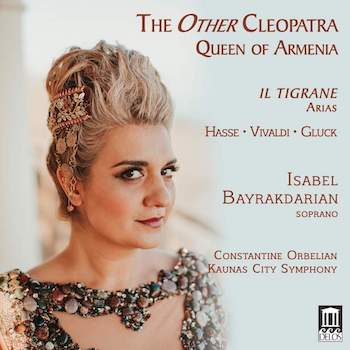Classical Album Review: “The Other Cleopatra”—Three Major Opera Composers Bring Us the Forgotten Queen of Armenia
By Ralph P. Locke
A delightful recording — and the first ever! — of arias from Hasse’s and Gluck’s operas about Tigranes and Cleopatra of Pontus. Plus four arias by Vivaldi for that same Cleopatra.
Isabel Bayrakdarian, soprano.
Kaunas City Symphony, cond. Constantine Orbelian.
Delos DE 3591

Here at Arts Fuse I recently drew attention to a remarkably effective opera about Cleopatra, Queen of Egypt, by a late 19th-century Danish composer, August Enna.
Along comes a single well-packed CD of arias from three important operas about a different Cleopatra: Cleopatra of Pontus (born 110 BCE, died after 58 BCE), the daughter of King Mithridates VI of Pontus — the conqueror of much of what is today Turkey — and, eventually, Queen Consort of King Tigranes the Great of Armenia (in Armenian: Tigran II or Tigran Mets).
The singer is the renowned lyric soprano Isabel Bayrakdarian, who carried out scholarly research for the project at the University of California, Santa Barbara, where she is on the voice faculty.
Bayrakdarian comes from an Armenian family that moved to Canada from Lebanon when she was a teenager. Opera lovers around the world have encountered her artistry on stage, CD, or video, in works by such composers as Mozart, Rossini, Debussy, Poulenc, and Bolcom. Millions of film fans enjoyed her (off-screen) singing in the Lord of the Rings without realizing who she was.
Back in 2005, Bayrakdarian gave due honor to the more famous (non-Armenian) Cleopatra in a CD released by the CBC. The richly informed John Barker declared in American Record Guide: “Nobody who loves great operatic singing and great baroque opera should miss this release.”
The three operas sampled on this new CD all treat a single topic: the love between Tigrane (who is at this point an Armenian prince; I give the characters’ names in their Italian form) and “the other Cleopatra” (to quote the CD’s title), a love that her father, Mitridate, who is Tigrane’s enemy, attempts in various ways to block.
We hear excerpts from Vivaldi’s setting (1724, for Rome), as well as from two operas by German-speaking composers active in Italy: Johann Adolph Hasse (1729, for Naples) and Christoph Willibald Gluck (1743, for the small city of Crema). The latter two works have not previously been recorded. For that reason alone, the disc commends itself to fans of 18th-century opera. These two works use the same libretto: Il Tigrane: La virtù trionfante dell’amore (Love’s Power at Triumphing [over Obstacles]), by Francesco Silvani (1660-1728). The Vivaldi — according to authoritative studies by Reinhard Strohm — uses a libretto by Pietro Andrea Bernardoni. (Bayrakdarian’s booklet-essay, oddly, treats the Vivaldi as yet another setting of the Silvani.)
One doesn’t have to be a specialist collector to take delight in the music-making here. Bayrakdarian, a magnificent singer, has maintained all the beauty and steadiness of her voice despite the passing of some years. Clearly, she has figured out what roles to take on and what ones to avoid. It must have been tempting for her to try Tosca, but she has apparently resisted, to our profit!
One of the fascinating aspects of this disc is hearing three different composers writing in roughly the same style during roughly the same era but with different temperaments and, to some extent, different musical means. Two oboes and two horns suddenly appear in the Gluck excerpts, reminding us that his opera is 19 years later than Vivaldi’s and that by this point Haydn was already beginning to compose.
Bayrakdarian and conductor Constantine Orbelian adjust their tempi and style sensitively to match the shifting emotions that Princess Cleopatra traverses as she reacts to such things as her father’s impending marriage to her own rival Apamia, or her beloved Tigrane’s declaration that he will die in battle against her stubborn father rather than live without her — but that, he insists, she should live on.

Renowned lyric soprano Isabel Bayrakdarian. Photo: On Stage.
Unlike some early-music singers today, Bayrakdarian’s voice is full and rounded at both the top and bottom, and she never takes tempos so fast that the musical line gets shattered into a series of consonantal explosions. One can listen to this disc for pleasure, repeatedly, whether paying attention to the words or not.
Fine instrumental support is given by the Kaunas City Symphony (in Lithuania) and renowned harpsichordist Jory Vinikour. The disc is available through numerous retailers and streaming services (such as Spotify). You can hear the beginning of each of its tracks here.
Listening to this opera about the (future) ruling couple of ancient Armenia led me to become more familiar with the history of that land and people. During the days of the Roman Empire, Armenia became a major power, under — precisely — Tigranes the Great. Several hundred years later, under Tiridates III (in Armenian, Trdat), it would become the earliest state to accept Christianity as its official religion. That major shift could perhaps provide the basis for a good new oratorio, opera, or film!
Ralph P. Locke is emeritus professor of musicology at the University of Rochester’s Eastman School of Music. Six of his articles have won the ASCAP-Deems Taylor Award for excellence in writing about music. His most recent two books are Musical Exoticism: Images and Reflections and Music and the Exotic from the Renaissance to Mozart (both Cambridge University Press). Both are now available in paperback; the second, also as an e-book. Ralph Locke also contributes to American Record Guide and to the online arts-magazines New York Arts, Opera Today, and The Boston Musical Intelligencer. His articles have appeared in major scholarly journals, in Oxford Music Online (Grove Dictionary), and in the program books of major opera houses, e.g., Santa Fe (New Mexico), Wexford (Ireland), Glyndebourne, Covent Garden, and the Bavarian State Opera (Munich).
Tagged: Cleopatra, Delos, Isabel-Bayrakdarian, Kaunsas City Symphony
